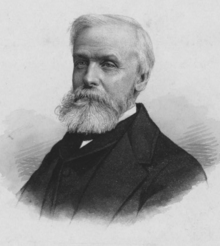Evert Augustus Duyckinck
| Evert Augustus Duyckinck | |
|---|---|
 |
|
| Born |
November 23, 1816 New York City, New York |
| Died | August 13, 1878 (aged 61) New York City, New York |
| Spouse(s) | Margaret Wolfe Panton (m. 1840) |
| Children | Evert Augustus Duyckinck II George Duyckinck Reverend Henry Duyckinck (1843-1870) |
| Parent(s) | Harriet June Evert Duyckinck (1764?-1833) |
| Relatives | George Long Duyckinck (1823-1863), brother |
| Signature | |
Evert Augustus Duyckinck (pronounced DIE-KINK) (November 23, 1816 – August 13, 1878) was an American publisher and biographer. He was associated with the literary side of the Young America movement in New York.
He was born on November 23, 1816, in New York City to Evert Duyckinck, a publisher.
Evert the younger graduated from Columbia College, where he was a member of the Philolexian Society, in 1835. He then studied law with John Anthon, and was admitted to the bar in 1837. He spent the next year in Europe. Before he went abroad he wrote articles on the poet George Crabbe, the works of George Herbert, and Oliver Goldsmith, for the New York Review. In 1840 he started a monthly magazine with Cornelius Mathews called Arcturus, which ran until 1842. The New York Tribune commented on the important partnership by referring to Duyckinck and Mathews as "the Castor and Pollux of Literature—the Gemini of the literary Zodiac". Duyckinck wrote articles on other authors while at home and in Europe. Between 1844 and 1846, Evert became the literary editor of John L. O'Sullivan's The United States Magazine and Democratic Review, which moved from Washington D.C. to New York in 1840.
On April 22, 1840 in Connecticut he married Margaret Wolfe Panton, and they had as their children: Evert Augustus Duyckinck II, George Duyckinck, and Henry Duyckinck (1843-1870). All of his children died when they were young.
In 1845, he assisted Edgar Allan Poe in printing his Tales collection and selected which stories to include. The collection was a critical success, though Poe was somewhat disappointed by Duyckinck's choices. In 1847 he became the editor of The Literary World, a weekly review of books written with his brother George Long Duyckinck until 1853. The two brothers became the unofficial leaders of the New York literary scene in the 1840s into the 1850s.
...
Wikipedia
